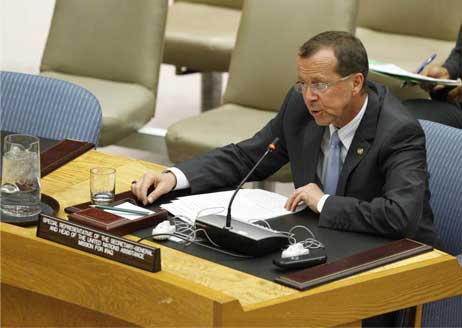| TEHRAN (FNA)- Special Representative of the United Nations Secretary-General for Iraq (SRSG) Martin Kobler expressed anger at the lack of cooperation of the terrorist Mojahedin-e Khalq Organization (MKO, also known as the MEK, NCRI and PMOI) in their resettlement and departure from Iraq. |
 Kobler (UNAMI) made the remarks while briefing the Foreign Affairs Committee of the European Parliament (AFET) on the current developments in Iraq in a meeting on May 29.
Kobler (UNAMI) made the remarks while briefing the Foreign Affairs Committee of the European Parliament (AFET) on the current developments in Iraq in a meeting on May 29.
Kobler also briefed AFET on UNAMI's efforts to resettle the former residents of Camp Ashraf to third countries.
He deplored the lack of cooperation of the residents and of their leadership with the UNHCR and UN monitors, and urged them to accept concrete resettlement offers. Stressing that "resettlement to safe countries is the only durable option", he called again on European Union member states to accept former Camp Ashraf residents into their countries.
Meantime, reports said on Saturday that MKO members are running away from the group's transient settlement facility, Camp Liberty, before they are sent by their leaders to other countries.
According to a report by Ashraf News website, an informed source in the committee supervising the Camp Liberty affairs said that five MKO members had fled the Camp two days ago.
The informed source named the defectors as Arshad Shekarzehi and Hassan Sha'bani as well as three other members who were not named.
They surrendered to the Iraqi security forces and were transferred to the UN mission in Baghdad, the source added.
Many of the MKO members have abandoned the terrorist organization while most of those still remaining in the grouplet are said to be willing to quit but are under pressure and torture not to do so.
A recent Human Rights Watch report accused the MKO of running prison camps in Iraq and committing human rights violations.
According to the Human Rights Watch report, the outlawed group puts defectors under torture and jail terms.
The group, founded in the 1960s, blended elements of Islamism and Stalinism and participated in the overthrow of the US-backed Shah of Iran in 1979. Ahead of the revolution, the MKO conducted attacks and assassinations against both Iranian and Western targets.
The group started assassination of the citizens and officials after the revolution in a bid to take control of the newly-established Islamic Republic. It killed several of Iran's new leaders in the early years after the revolution, including the then President, Mohammad Ali Rajayee, Prime Minister, Mohammad Javad Bahonar and the Judiciary Chief, Mohammad Hossein Beheshti who were killed in bomb attacks by MKO members in 1981.
The group fled to Iraq in 1986, where it was protected by Saddam Hussein and where it helped the Iraqi dictator suppress Shiite and Kurd uprisings in the country.
The terrorist group joined Saddam's army during the Iraqi imposed war on Iran (1980-1988) and helped Saddam and killed thousands of Iranian civilians and soldiers during the US-backed Iraqi imposed war on Iran.
Since the 2003 US invasion of Iraq, the group, which now adheres to a pro-free-market philosophy, has been strongly backed by neo-conservatives in the United States, who argued for the MKO to be taken off the US terror list.
The US formally removed the MKO from its list of terror organizations in early September 2012, one week after Secretary of State Hillary Clinton sent the US Congress a classified communication about the move. The decision made by Clinton enabled the group to have its assets under US jurisdiction unfrozen and do business with American entities, the State Department said in a statement at the time.
In September 2012, the last groups of the MKO terrorists left Camp Ashraf, their main training center in Iraq's Diyala province. They have been transferred to Camp Liberty which lies Northeast of the Baghdad International Airport.
Camp Liberty is a transient settlement facility and a last station for the MKO in Iraq.
